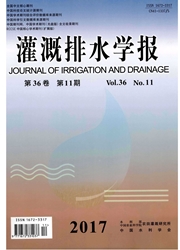

 中文摘要:
中文摘要:
通过田间试验,采用气压分离过程法(BaPS)测定了2个氮肥处理下,玉米/大豆间作群体的土壤呼吸速率、硝化速率和反硝化速率。结果表明,施氮处理根区根系生物量高于不施氮处理,而非根系生物量差异较小。施氮处理下,根区土壤呼吸速率约为不施氮处理的1.1倍,非根区土壤呼吸差异较小。施氮处理下,玉米和大豆条带土壤硝化速率分别约为不施氮处理的1.71倍和1.82倍。施氮和不施氮处理下,间作条带根区硝化速率均高于非根区。反硝化作用不是试验区玉米/大豆间作系统氮肥损失的主要途径。因此,该区加强水肥管理以控制硝化-反硝化作用,有利于减少间作系统的氮流失和提高氮肥利用效率。
 英文摘要:
英文摘要:
Field experiments were carried out to measure soil respiration,nitrification and denitrification in the intercropping system under two nitrogen treatments using the Barometric Process Separation(BaPS)method.Results indicated that root biomass in the rhizosphere in N1 treatment was greater than that in N0 treatment.There was no significant difference for root biomass in the non-rhizosphere between two N treatments.Soil respiration rate in the rhizosphere in N1 treatment was 1.1times compared to that in N0 treatment,while the difference of soil respiration in the non-rhizosphere between two N treatments was not significant.Soil nitrification rate in maize and soybean strips in N1 treatment was 1.71 and 1.82 times compared to that in N0 treatment,respectively.For two N treatments,soil nitrification in the rhizosphere was greater than that in the non-rhizosphere in intercropping.Denitrification was not the main way of nitrogen losses in maize/soybean intercropping in the experimental region.Therefore,it is favorable to reduce nitrogen losses and improve nitrogen fertilizer use efficiency in intercropping through enhancing water and fertilizer management in study areas.
 同期刊论文项目
同期刊论文项目
 同项目期刊论文
同项目期刊论文
 期刊信息
期刊信息
